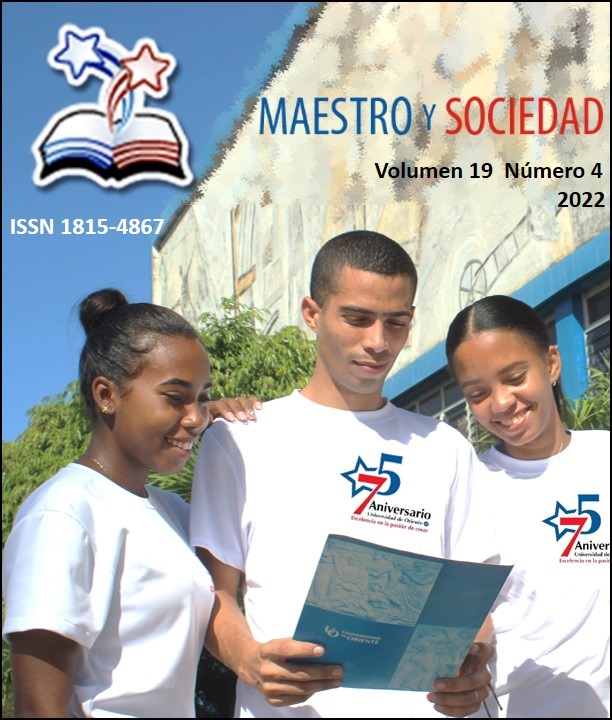Algunas consideraciones sobre la lectura inteligente de textos en inglés para estudiantes universitarios
Some considerations about the intelligent reading of test in English for university students
Palavras-chave:
lectura inteligente, estrategias sociocognitivas, textos en inglés, intelligent reading, sociocognitive strategies, texts in EnglishResumo
La lectura de material escrito en inglés es una condición elemental para la construcción y desarrollo del conocimiento en el ámbito académico. No obstante, el avance significativo de esta habilidad ha tenido sus tropiezos debido a que el estudiante no aplica estrategias metacognitivas de manera adecuada y contextualizada. Además, no realiza interpretaciones críticas y reflexivas de su realidad social, lo cual resulta en una construcción cognitiva y social del conocimiento debilitada o descontextualizada. La lectura, es interpretada como una actividad sociocognitiva para la cual se hace necesario el análisis de las teorías cognitivas sobre esquemas de conocimiento previo e igualmente, de teorías sociales referidas a la importancia del diálogo, la interacción y la negociación de significados al momento de interactuar con el texto, así como otros lectores que compartan la actividad de interpretación y comprensión de dicho texto. En el presente trabajo se reflexiona sobre estrategias sociocognitivas para el abordaje de la lectura en inglés en los cursos de formación básica en estudiantes universitarios.
Reading written material in English is an elementary condition for the construction and development of knowledge in the academic field. However, the significant advance of this ability has had its setbacks due to the fact that the student does not apply metacognitive strategies in an adequate and contextualized manner. In addition, it does not make critical and reflective interpretations of its social reality, which results in a weakened or decontextualized cognitive and social construction of knowledge. Reading is interpreted as a sociocognitive activity for which it is necessary to analyze cognitive theories about prior knowledge schemes and also social theories referring to the importance of dialogue, interaction and the negotiation of meanings when interacting. with the text, as well as other readers who share the activity of interpretation and understanding of said text. In the present work, we reflect on sociocognitive strategies for approaching reading in English in basic training courses for university students.
Referências
Benítez-Burraco, A. (2019). Bases moleculares de la dislexia. Revista de Neurología, 45(8), 491-502.
Blumstein, S. E. (2021). Deficits of speech production and speech perception in aphasia. En F. Boller, & J. Grafman (eds), Handbook of Neuropsychology (pp. 95-13). Amsterdam: Elsevier.
Díaz-Barriga, F. y Hernández, G. (2022). Estrategias docentes para un Aprendizaje Significativo: Una interpretación constructivista. McGraw-Hill Inc.
Dronkers, N. F., Pinker, S., & Damasio, A. (2014). Lenguaje y afasias. En E.R. Kandel, (Ed.), Principios de neurociencia (pp. 1169-85). Mc Graw-Hill.
Fernández, P. (2009). Conocimiento previo, esquemas de género y comprensión lectora en inglés. Universidad de Murcia.
Indefrey, P., & Levelt, W. (2019). The neural correlates of language production. En M.S. Gazzaniga, (ed.). The New Cognitive Neurosciences (pp. 845-65). MIT Press.
Martin, N., & Saffran, E.M. (2012). The relationship of input and output phonological processing: an evaluation of models and evidence to support them. Aphasiology, 16, 107-50.
Martin, R. (2010). Sentence comprehension. En B. Rapp (ed), The handbook of cognitive neuropsychology (pp. 349-73). Psychology Press.
Martin, R.C. (2003). Language processing: functional organization and neuroanatomical basis. Annual Review of Psychology, 54, 55-9.
Soler, M. (2003). Lectura dialógica. La comunidad como entorno alfabetizador". En: A. Teberosky y M. Soler (Comps.), Contextos de alfabetización inicial (pp. 47-63). ICE/ Horsori.
Toledo, A. (2021). Relación entre el nivel de compresión de lectura y uso de estrategias de comprensión en estudiantes de Idiomas Modernos. Universidad Nacional Experimental Simón Rodríguez.
Valls, R., Soler, M. y Flecha, R. (2018). Lectura dialógica: interacción es que mejoran y aceleran la lectura. Revista Iberoamericana de Educación, (46), 71-87.
Publicado
Como Citar
Edição
Seção
Licença
Copyright (c) 2022 Marisol Yanez-García, María Victoria Heredia-Yanez, Antonia Monserrate Laaz-Velez, Jean Wilfredo Alcívar-Alcívar

Este trabalho está licenciado sob uma licença Creative Commons Attribution-NonCommercial-NoDerivatives 4.0 International License.
Esta revista proporciona un acceso abierto inmediato a su contenido, basado en el principio de que ofrecer al público un acceso libre a las investigaciones ayuda a un mayor intercambio global de conocimiento. Cada autor es responsable del contenido de cada uno de sus artículos. Los artículos pueden ser inéditos o estar disponibles previamente en servidores de preprints reconocidos por la revista. Sin embargo, no se permite la duplicación de la publicación o traducción de un artículo ya publicado en otra revista o como capítulo de un libro.
This journal provides immediate open access to its content, based on the principle that providing the public with free access to research supports a greater global exchange of knowledge. Each author is responsible for the content of each of their articles. Articles may be previously unpublished or available on preprint servers recognized by the journal. However, duplication of publication or translation of an article already published in another journal or as a book chapter is not permitted.
Esta revista oferece acesso aberto imediato ao seu conteúdo, com base no princípio de que oferecer ao público acesso gratuito à pesquisa contribui para um maior intercâmbio global de conhecimento. Cada autor é responsável pelo conteúdo de cada um de seus artigos. Os artigos poderão ser inéditos ou estar previamente disponíveis em servidores de preprints reconhecidos pela revista. No entanto, não é permitida a duplicação de publicação ou tradução de artigo já publicado em outro periódico ou como capítulo de livro.



























 Universidad de Oriente
Universidad de Oriente 